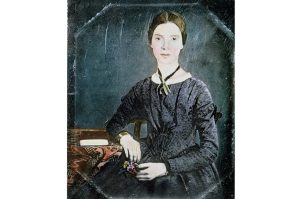Batavia, New York
A staticky nimbus surrounds Mexican radio and the legendary border stations that kinda came through on 1970s transistors across the American Southwest, but what about the experience of those of us in the frozen North, along the Canadian border, who grew up listening to Canuck pop-rock, to lugubrious Leonard Cohen or the icy new wave of Martha and the Muffins or the Poppy Family’s plaintive query, ‘Which way you goin, Billy?’
This assertion of Canadianness received its most powerful, even moving, exposition in the philosopher George Grant’s Lament for a Nation: The Defeat of Canadian Nationalism (1965), which was the meditation of a conservative pacifist patriot on the broader meaning of the noble fight by Progressive Conservative prime minister John Diefenbaker — a prairie lawyer — and other ‘nationalist hayseeds’ to bar US nuclear weapons from Canadian soil. Diefenbaker was crushed by the pro-nuke Liberals and ‘the full weight of the North American establishment,’ said Grant.
I suppose the Guess Who’s ‘American Woman’ stands in for Diefenbaker and Grant, with its lyric, penned by Winnipeg’s Burton Cummings: ‘I don’t need your war machines/ I don’t need your ghetto scenes.’ Diefenbakerian prairie populism was rooted in the western provinces, but my exposure to the amplified voice of our neighbor to the north came from Toronto radio stations and the televised Hockey Night in Canada. How we loved to imitate Hockey Night’s Howie Meeker screeching, ‘The net is off its moorings!’ or, in later years, listen to true-blue Canadian tough guy Don Cherry gleefully mock European players as prancing sissies. Octogenarian Cherry was canned in 2019 for criticizing recent Canadian immigrants who don’t sport Remembrance Day poppies. I think the First World War was a disgraceful waste of human life and I have no idea what Toronto Sikhs pin on their lapels, but Christ Almighty, can’t a guy speak his mind anymore? (Don’t bother answering that question; I already know.)
I was probably too young to have seen hockey analyst Scott Young on CBC, but I have heard his singer-son, an expat who switched his allegiance from the Toronto Maple Leafs to the San Jose Sharks.
Even a foreigner like me feels a fillip at the occasional provincial reference in a song, as when Scott Young’s boy Neil pipes, ‘There is a town in North Ontario.’ I’m boycotting my (and George Grant’s) favorite CFL team, the Hamilton Tiger Cats, because they demolished venerable Ivor Wynne Stadium — where drunken Toronto hating fans chanted ‘Argos suck!’ even when the Toronto Argonauts were not the day’s opponent — but I’ll still turn up the radio for a tune by the Stampeders of Calgary, who share their name with that city’s football team, and whose greatest hit (‘Sweet City Woman’) praises a woman who feeds the singer macaroons.
Ivor Wynne Stadium has given way to Tim Hortons Field — proles, as Paul Fussell remarked, are not overly punctilious about apostrophes — which is defaced by luxury boxes and soccer accommodations and a video board. Its eponym, Tim Horton, was a Hall of Fame hockey player who was killed when he crashed his sports car while driving drunk but who achieved commercial immortality through the coffee and donuts chain he founded.
Thanks to Toronto’s powerful AM 740, which styles itself ‘Zoomer Radio’ and aims its pitch at tea-sipping pensioners, superannuated bobby-soxers and Roger Whittaker fans, I still get my kicks with a Canadian fix.
It’s the oddities, those tunes that never hit the American charts, that I cherish. There’s Ray Materick’s ‘Linda, Put the Coffee On,’ perhaps the most quotidianly titled domestic tune ever recorded. In ‘What the Hell I Got,’ French-Canadian Michel Pagliaro rather urgently informs us that an inamorata of especial charm has made him lose control of his liver. I shudder to imagine.
Oh, Andy Kim and Doug and the Slugs and Mashmakan and Major Hoople’s Boarding House and the Cowboy Junkies: keep on rockin’ in the Cree world. I never have been able to track down a tune I heard some years back on a Toronto station. Its subject was Margaret Atwood, ‘Canadian Culture Vulture,’ and the singer confessed that he’d really ‘like to get a piece of that handmaid’s tail.’
Now, that’s lit-wit.
This article was originally published in The Spectator’s January 2021 US edition.


















